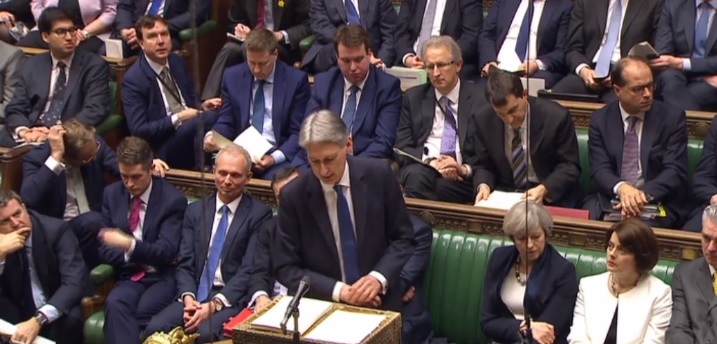
Chancellor Philip Hammond offered £435 million to address changing business rates, with nothing specifically set aside for solar.
Chancellor Philip Hammond has offered nothing to address concerns over the increased business rates applied to properties with solar in his maiden budget delivered earlier today.
Pressure has ramped up over the issue with large and small businesses, schools, industry members and trade bodies all joining the campaign against the ‘solar tax hike’ since it was first raised by the Solar Trade Association (STA) last summer.
However, speaking today in the Commons, Hammond outlined three measures designed to offset wider concerns over the business rates revaluation regime, none of which stand to directly address the drastic increase on properties with solar.
Small businesses coming out of transitional rate relief will benefit from a cap meaning no more than £50 a month will be applied; a £1,000 discount for the majority of UK pubs will be available; and a £300 million discretionary fund will be available for local authorities to use for ‘hard cases’ where the rates have been particularly biting.
The chancellor offered nothing more in his speech on the issue, leaving many disappointed that the government had failed to heed calls from multiple sources and the over 200,000 signatories of a petition urging the government to reconsider the plans.
Well, nothing in the business rate chunk! #SolarTaxHike #Budget2017
— Leonie Greene (@LeonieGreene) 8 March 2017
Pre-empting the release of the Treasury documents, Greenpeace UK policy director Doug Parr said: “It appears the chancellor has failed to properly address the massive tax hike of business rates on commercial solar. The temporary reprieve of a £300m discretionary fund for local authorities is just a drop in the ocean.
“It just delays the inevitable for the 23,000 schools, hospitals and offices who installed solar to generate their own energy and reduce bills, and now have to pay much more than they bargained for.
“Crucially, this alone does not go far enough to prevent these damaging tax hikes from making future solar investment uneconomic – putting the brakes on a sector with major growth potential and leading to thousands more job losses.
“Globally, there has been record installation of solar panels to harness the sun’s energy, but the UK government risks going backwards. People trying to do the right thing and generate their own renewable energy, are going to be hit by massive bills.”
Rates are likely to increase by between six to eight times current levels under the plans due for implementation next month, when small installations below 50kW will also have rates applied for the first time. According to the Green Party peer Jenny Jones, schools are likely to be hit with almost £2 million in annual payments as a result.
Nothing for 1000s of schools and community groups hit by #SolarTaxHike. #Budget2017
— Caroline Lucas (@CarolineLucas) 8 March 2017
This is a developing story and more spring budget coverage will be added throughout the day.
